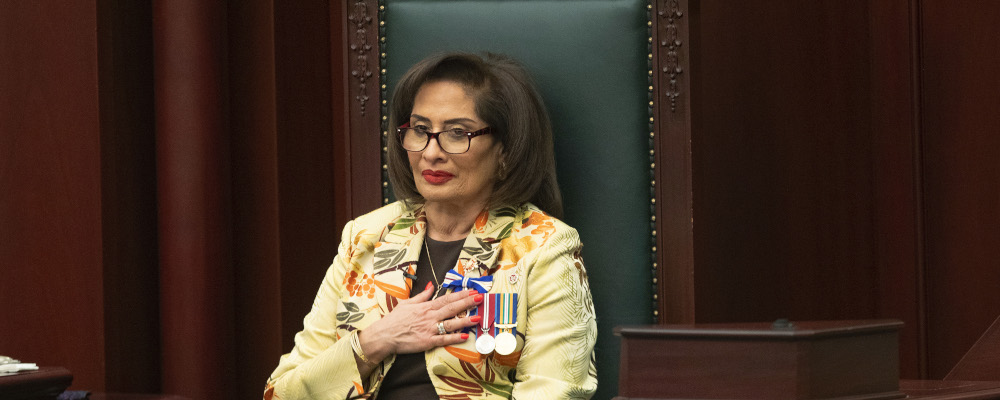Someone needs to explain to Alberta’s Lieutenant Governor, Salma Lakhani, who yesterday suggested that she might refuse to grant royal assent to Danielle Smith’s proposed Alberta Sovereignty Act, that constitutional law isn’t math: you can’t correct an unconstitutional Act with an unconstitutional act. Two negatives, in this case, don’t make a positive.
Rather than cancel each other out, Smith’s political gambit and the spectacularly inappropriate public musings of Alberta’s viceroy could compound and build into a perfect storm of unconstitutionality. That is, if one or the other doesn’t reconsider her position. To understand why, it may be helpful to review the fundamental but often (and understandably) misunderstood concept of unconstitutionality in our system of government.
The sense of “unconstitutional” with which most Canadians are familiar is the sense in which a court uses it when it nullifies a law or disapproves an act of government. It means that the law or the action is of no legal force or effect because it is inconsistent with the court’s interpretation of the constitution (usually, but not always, the written text of the Charter or the division of powers between the provinces and the federal government).
But there is another, older sense, which you hear more commonly in countries like the United Kingdom that do not have a federal system of government and have not given the courts the power to strike down duly enacted laws. In this sense, “unconstitutional” means that a law or an act is inconsistent with established and generally accepted political practice, despite being of legal force and effect.
This second sense of “unconstitutional” is also important in Canada because much of the constitution we inherited from Westminster is unwritten or written in informal and easily-amendable documents like the standing orders that govern the conduct of business in Parliament or the provincial legislatures. Famously, the role of the prime minister is not defined anywhere in the Canadian constitution and the cabinet, which is for most practical purposes the Government of Canada, isn’t even mentioned.
This means that how our government actually works is often not specified by text but carried on as processes that are, or should be, familiar to the institutional actors involved. Among these processes are what are known as constitutional conventions. Constitutional conventions are a curiously fragile paradox. They are foundational but ephemeral; binding but unenforceable; well-known but nowhere written down. Their role is not to tell us what cannot be done, but rather what must not be done.
It is in this second sense that, if the Lieutenant Governor followed through on her suggestion, she would be acting unconstitutionally. First, because in our system of government, laws are presumptively constitutional until they are formally declared to be unconstitutional by a court. And second, because the Queen’s representatives are neither equipped institutionally nor empowered constitutionally to opine on the legality of a bill presented to them for royal assent.
But wait, I hear some of you say. Hasn’t this happened before? Haven’t Lieutenant Governors in fact refused to grant royal assent to provincial legislation that they believed was unconstitutional? Yes, this is true. Section 55 of the Constitution Act, 1867 says that a Lieutenant Governor may “reserve” the decision on royal assent, which kicks the approval decision to the federal government.
This happened most infamously in 1937, when Alberta’s Lieutenant Governor John Bowen reserved royal assent for three bills introduced by the Social Credit government while the Supreme Court of Canada opined on their constitutionality.The full history of the bills, one of which was effectively a “Fake News” bill avant la lettre, and of the admirably petty retribution taken by the government, including cutting off the utilities to the Lieutenant Governor’s house and forcing him to move into rooms at the Hotel Macdonald, is available here. The Supreme Court of Canada eventually declared the legislation to be beyond the power of the provincial government.
The last time a Lieutenant Governor used the power of reservation was in 1961. In that case, Saskatchewan Lieutenant Governor Frank Bastedo withheld assent to a bill from the province’s CCF government that altered legal rights associated with several hundred mineral contracts. Although Bastedo’s advisors urged him to sign the bill, he objected that “[t]here is grave doubt as to its validity.” Eventually, the federal cabinet overruled his misgivings and granted royal assent.
Since then, no Canadian viceroy has exercised the power of reservation. In retrospect, we can see Bastedo’s nakedly ideological use of the power as a constitutional turning point. It didn’t help that, in both of the cases described above, the viceroy withholding royal assent was a former partisan of the opposition party. In Bowen’s case, he was the former Liberal party leader; in Bastedo’s case, he was the president of the Regina Conservative Association.
Over the intervening 61 years, the practice of restraint has almost certainly calcified into a constitutional convention, regardless of the viceroy’s motivation. This means that exercising the power of reservation would be unconstitutional in the second sense described above even though it would not be unconstitutional in the first sense, because the power remains in the text of the constitution.
Or, to put it another way (and one that illustrates the subtle shadings of constitutional theory and practice), the convention of vice-regal impotence, though unenforceable in law, now carries more constitutional weight and legitimacy than the constitutional text, which remains the law.
But before supporters of the Alberta Sovereignty Act get too indignant, they should reflect that their hands are less than clean in this affair. The only reason that Lakhani—or any of us—is talking about the Alberta Sovereignty Act is that it is both in essence and by design flagrantly unconstitutional. As one of its authors has written, “that is the whole point”!
Smith has been rather coyer. Although she has not ruled out using the act in unconstitutional ways, she has defended that it is “a tool, based in the rule of law,” that would simply protect Alberta against Ottawa’s unconstitutional intrusions on the province’s constitutional powers. As she put it in response to the Lieutenant Governor’s comments, the act will be “rooted in the Constitution, specifically Sections 92-95, with special notion (sic) to 92A along with the Canadian Charter of Rights and Freedoms.” But this confuses unconstitutional means with constitutional ends.
The problem with the Alberta Sovereignty Act is not its diagnosis of the problem (I agree that the Supreme Court of Canada has often been overly deferential to federal power), but its proposed solution. According to Smith, the act would give the Alberta legislature the authority to make a final determination of what is and what isn’t constitutional when the province and Ottawa disagree. That, to be blunt, is just not how the constitution works, or ever could work.
In a dispute between two governments, each sovereign in its own sphere, it is not for one of the two disputants—in this case the provincial legislature—to decide which is right.In fact, our constitution provides various ways in which, in extreme cases, the federal government can resolve a clash between itself and a provincial government in its favour, which means Smith’s proposal is not merely unconstitutional but would flip the constitutional order on its head. Instead it should fall to a third party to arbitrate the dispute, and in our constitutional system that is the judiciary.Until 1949, the Judicial Committee of the Privy Council in the UK played this role. Interestingly, it was often criticized for promoting provincial power at the expense of a centralized federal government—the opposite of the criticism you rightly here today of the Supreme Court of Canada. Both Smith’s plan and the Lieutenant Governor’s reaction misunderstand this—the first because she doesn’t like it, the second because she apparently doesn’t understand it.
It is hard to say which is worse, intentional unconstitutionality or ignorant unconstitutionality, but neither is good and together they could prove combustible. Smith has good, if cynical, political reasons for taking the position she has, so I don’t expect her to moderate it, but Lakhani has no such excuse for her position and every reason to correct it. Quickly, please.
Recommended for You

Scandalous politicians could finally face serious consequences if this Supreme Court case is won, says democracy watchdog

Don’t downplay the costs of the AI revolution: The Weekly Wrap

Jewish groups advocate for new hate crime laws and better police tools to punish perpetrators

‘It’s in the Liberals’ interest’: The Roundtable on whether Trump’s antics will trigger an early election




